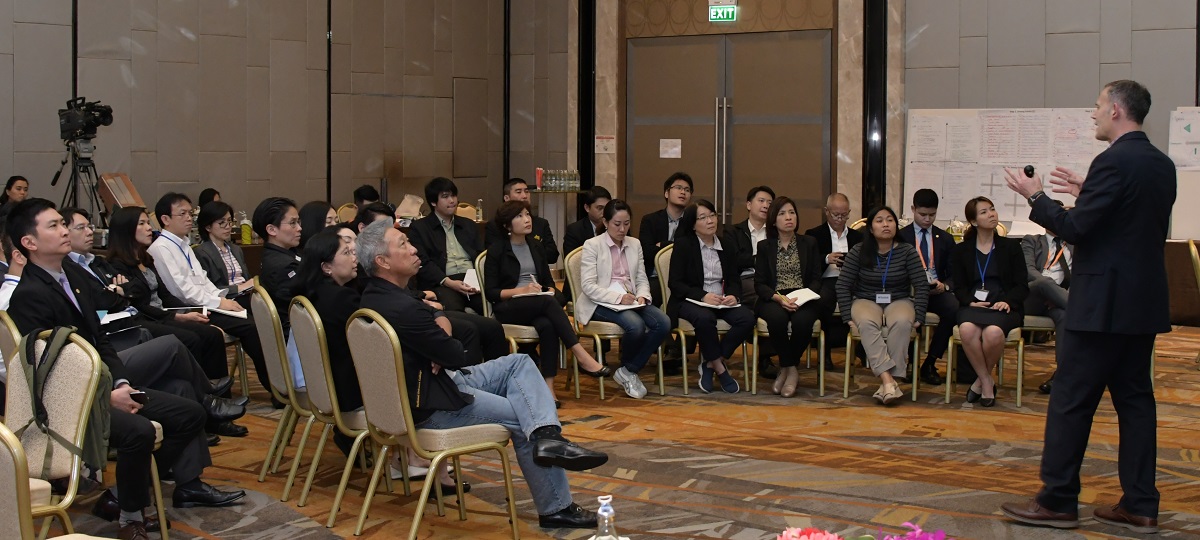
Select Page
Genetic engineering, automation, and the rise of new political movements worldwide are set to drive changes in coming decades. However, these changes are difficult, if not impossible, to predict. To build the capacity of its member countries to anticipate them and plan for the long term, the Asian Productivity Organization (APO) recently launched the second phase of training activities on strategic foresight and scenario planning.
As part of the series, the APO along with the Thailand Productivity Institute (FTPI) conducted the first training of trainers program on Strategic Foresight and Scenario Planning in Bangkok, 12–16 November 2018. The workshop aimed to develop foresight practitioners who can lead scenario development in their countries and train others. The APO strategic foresight movement has been gaining steam after conducting the first-phase strategic foresight overview workshops in Bangkok, Manila, and Colombo between September and October this year.
 Highlighting the importance of the workshop, APO Secretary-General Dr. Santhi Kanoktanaporn said that it had been designed to take participants, who were already trainers, through an accelerated process of honing the art of strategic foresight facilitation and scenario discussions.
Highlighting the importance of the workshop, APO Secretary-General Dr. Santhi Kanoktanaporn said that it had been designed to take participants, who were already trainers, through an accelerated process of honing the art of strategic foresight facilitation and scenario discussions.
“Within the next six months, workshop participants will be expected to conduct local workshops to train other government officials in strategic foresight and scenario planning. This is the leverage mechanism that will help spread the skill sets of strategic foresight across all agencies and industry sectors within member countries,” he stated.
The Secretary-General pointed out that the workshop would provide participants with a proven future-facing approach to strategy development and an understanding of how scenario planning can help make sense of an uncertain, complex environment: “This is a major step toward the transformation initiative that the APO is undertaking to improve productivity in the five key areas of industry, agriculture, services, the public sector, and future food to meet food security requirements.”
Dr. Santhi also informed that the APO had established the Specific National Program to co-create productivity initiatives aligned with specific needs and to help improve the macroeconomic environment for productivity enhancement in member countries through policy interventions.
Welcoming the participants, APO Alternate Director for Thailand Dr. Phanit Laosirirat highlighted that in modern management practices, strategic planning and the balanced scorecard approach were widely used among mid- to large-scale organizations, including the public sector. “In the postmodern, chaotic era, the changes are extremely swift and unpredictable, which leads to difficulties in planning, especially at national level,” he commented.
Dr. Laosirirat explained that the Government of Thailand had adopted a 20-year strategic plan to cope with national issues and expectations from all stakeholders, adding that it would soon set up a new foresight unit within the National Economic and Social Development Board to accumulate know-how on the subject.
This workshop was conducted by APO-assigned resource person Scenario Insights LLC Principal Jonathan Star. The workshop was offered to increase participants’ knowledge of scenario planning processes as well as to develop the capabilities of trainers in using tools like interviewing, facilitation, and training design.
Foresight and scenario planning are valuable tools for governments and organizations. By training trainers, the APO aims to empower member countries to undertake their own capability-building efforts in strategic foresight and scenario planning, helping them to shape and adapt to the future.
Photo: FTPI